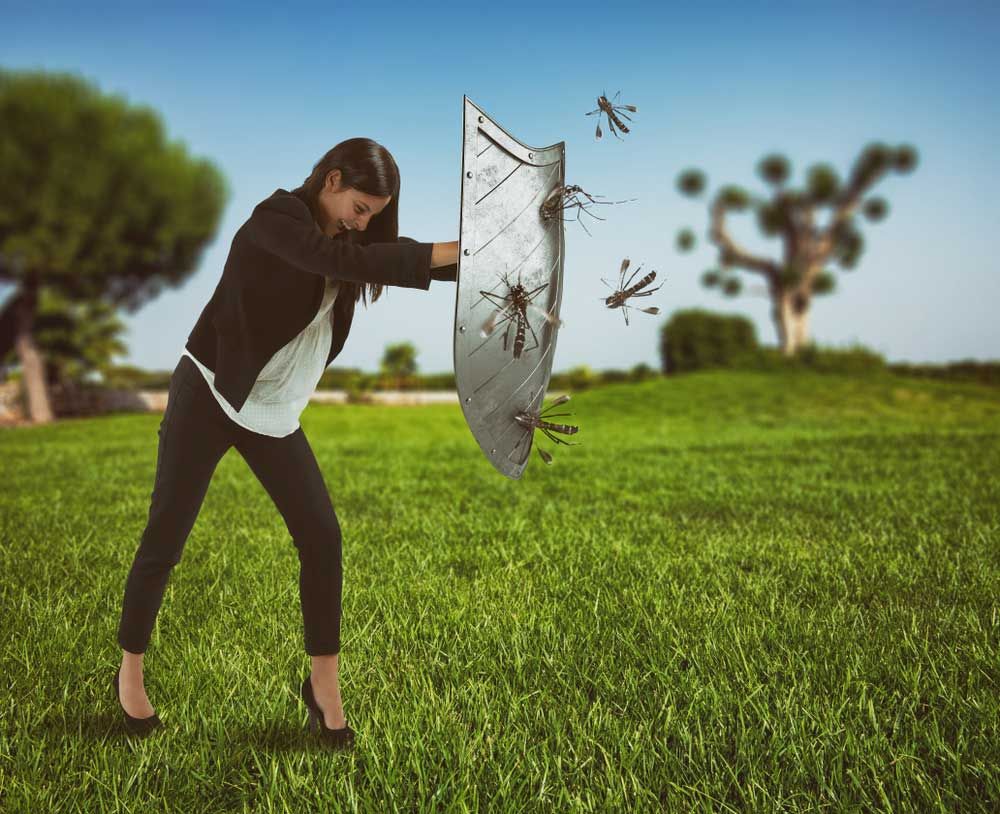I’m a true mosquito magnet. As soon as mosquito season kicks off, my skin gets bumpy and itchy from the many bites. For years, I doused myself in Deet and used chemical repellants at sprays at home but as my interest in complementary and natural health options grew, I started looking for more natural alternatives to stay mosquito-bite-free.
Over 400 chemical compounds on human skin may play a role in attracting mosquitos. Produced by bacteria living on our skin and exuded when we sweat, the mix varies from person to person. This may explain why some of us attract more mosquitos than others. Our genetic makeup probably plays the largest role, while part of it may be related to our diet or physiology.
Different kinds of mosquitoes prefer bacteria and sweat; malaria-carrying mosquitoes are one example. Other kinds are attracted to carbon dioxide or lactic acid. And, by the way, only female mosquitoes bite – they need the protein found in blood to produce their eggs.
Here are some of my favorites tried and tested natural mosquito repellants:
Natural DIY mosquito spray
I like to make my own natural homemade mosquito spray to avoid potentially harmful chemical products; it takes just minutes to mix.
Needed:
- Citronella essential oil (Cymbopogon nardus)
- Fine Lavender essential oil (Lavandula angustifolia)
- Carrier oil: macadamia, apricot, or almond vegetable oil
- 30 ml bottle with eye dropper
Directions:
Add 25 drops (1 ml) of the Citronelle oil and 38 drops (1,5 ml) of the Fine Lavender to your bottle and then fill it to the top with the carrier oil.
Then apply a few drops to the exposed parts of your body, avoiding your face, twice per day.
For children, use only the 25 drops of Fine Lavender essential oil mixed with a carrier oil as noted above.
Essential oil vapor
Another way to use essentials oils to repel mosquitos is to diffuse them. This will create a mosquito-free zone of 2 -3 meters.
Choose a mix of 2 or 3 of these essential oils: Fine Lavender, Citronella, geranium, or lemongrass. In case you’re diffusing inside your home, do not do so if any children under the age of 7 are present.
Cleaning floors and windows with essential oils
Add 20-40 drops of citronella essential oil (or any of the other essential oils mentioned above) to a full bucket of water and wash your floors, especially near entrances to your home.
You can also add 10 drops of one of the same oils to a spray bottle filled with water, spray it onto your windows and wipe them dry as you normally do.
Use mosquito repellent herbs and plants
Whether in a garden, on a balcony, or on windowsills, you can easily either buy or grow your own mosquito repellant herbs and plants such as:
- Basil
- Citronella
- Garlic
- Lavender
- Lemon balm
- Lemongrass
- Marigolds
- Peppermint
- Rosemary
If you decide to grow herbs, consider burning some on your grill when cooking outdoors to keep mosquitos at bay.
Install a fan
Mosquitoes can only fly in still air and the air currents created by a fan will keep them away from you.
Get rid of stagnant water
Make sure you do not have any stagnant water anywhere around your house – this is the perfect breeding ground for pesky mosquitos.
Treating mosquito bites
Of course, I do still get bitten by mosquitos occasionally. I’ve found that placing a slice of freshly cut garlic or raw onion on the bite or rubbing it with apple cider vinegar brings relief. Here also, the use of essentials oils is my preferred option. Not only do they relieve the itching and redness, but their antimicrobial and healing properties are a great way to avoid scratched bites from getting infected.
Fine Lavender, Tea Tree, and Eucalyptus Citriodora essential oils are very effective in treating mosquito bites due to their anti-inflammatory, pain-reducing, and calming properties.
To make your own after-bite gel mix 30 grams of Aloe Vera gel with:
- 10 drops of Fine Lavender
- 8 drops of Tea Tree
- 4 drops of Citriodora
Then apply a fine layer on the bite(s).
For children, use only 5 drops of Fine Lavender and 4 drops of Tea Tree essential oil mixed with the 30 grams of Aloe Vera gel.
Natural mosquito repellants can be effective alternatives for those of us who wish to avoid toxic chemicals and protect our environment.
Do you have a favorite natural bug repellent? Please share in the comment section below what works best for you.

